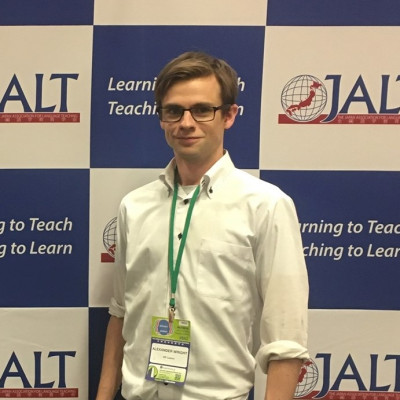Sessions / Zoom 6

Performance in Education (PIE) SIG AGM #832
This is the annual general meeting for the JALT Performance in Education (PIE) SIG. In this meeting we will report on SIG related events that took place in the past year, announce the results of our online elections, discuss future events, introduce SIG publications, and carry out other necessary business involving SIG officers and membership. All interested people are warmly invited to attend.

A Genre-Based Analysis of IELTS Writing Task 2 #756
The presenter will report the results of a genre-based research to questions and model essays for IELTS Task 2 in order to illustrate crucial factors to compose quality essays for this task. For analysis, 56 questions and 30 essays have been extracted from Cambridge IELTS Practice Tests. The presentation will clarify major topics and question types for Task 2, followed by suggesting an ideal essay structure and linguistic features.

Genre Pedagogy: Literacy and Teaching L2 Writing #609
The purpose of this study is (1) to determine if explicit writing instruction using the genre-based approach within the systemic functional linguistic (SFL) framework could be applicable to Japanese English as Foreign Language (EFL) learners as university students with differing levels of English proficiency and (2) to explore whether and if so how explicit writing instruction using a genre-based approach improves L2 novice writers’ understanding of different text genres.

Essay Writing: Student Self-Rating and Reflections #718
This presentation compares the self-assessments and reflections of the students in two classes—high-intermediate and low-intermediate—in a university essay-writing course in the academic year 2019. The students’ self-rating in both classes generally improved as the term proceeded, yet it was lower in citing outside sources. The students in the low-intermediate class rated themselves lower initially in writing with coherence and effective topic sentences and in writing opinion essays. Students’ reflection writing endorsed their self-assessments.

L2 Reading Fluency and L2 Reading Self-Efficacy #590
While L2 reading fluency researchers have mainly focused on the linguistic effects of reading fluency treatments, very few studies have examined how gains in reading fluency impact learners’ affect, such as their self-efficacy in L2 reading. Thus, this study focuses on the effects of timed reading, repeated oral reading, and extensive reading on reading fluency while concurrently examining changes in L2 reading self-efficacy among Japanese university students over a one-year period.

Teaching Reading Skills in Surround Sound #422
Although widely considered a receptive skill-set, teachers of both first (L1) and second language (L2) acquisition have categorized reading as an active process. Additionally, studies have shown that increased interaction in the classroom can improve motivation in L2 university learners. With some universities adopting 100-minute lecture periods, university teachers need to be equipped with a variety of tools to keep learners engaged and focused on specific reading skills, comprehension, and vocabulary development.

IELTS Writing Task 1: Handling a 2-Diagram Task #413
Promotional Visit the IELTS pageFor some test takers IELTS Academic Writing Task 1, describing data, is an unfamiliar exercise. Some of us are slightly uncomfortable with graphs and charts, so tasks that have 2 diagrams can be challenging. In this workshop we will work through some activities designed to help test takers develop techniques to deal with this task type.

Improving Lexical Diversity in Writing Through TBI #597
This presentation reports on findings from a mixed-methods research study with a total of 45 Japanese sophomore students to explore the effect of theme-based instruction (TBI) on their lexical diversity in academic essay writing, based on data collected from students’ five-paragraph academic essays as well as drafts, and their learning log notes. Findings revealed that students developed their lexical diversity in writing while integrating four language skills and working with their classmates.

Effective Incorporation of Facilitative Feedback #459
This presentation draws on literature review findings and aims to provide guidance regarding the successful implementation of written facilitative feedback into the writing process. However, because the review also shed light on some of the inherent weaknesses of facilitative feedback, this presentation will also provide avoidance strategies for the method’s most obvious shortcomings. Hopefully, this balance will let everyone walk away with at least one new idea about their writing feedback moving forward.

Written Corrective Feedback in a Digital Context #715
Take a look into a case of how a computer-based academic writing course was set up in a second-year university class context, and lessons that were learned along the way. Ask yourself, “How should we be giving learners feedback on their writing?” and consider how modern computers and the internet age have changed the answers to this question in ways you may not have expected.

Your Remote Academic Writing Teaching Assistant #395
Promotional Visit the mangoSTEEMS pageHow do you teach skills like essay writing remotely? How can you provide writing guidance and assistance to students in a structured way when you’re not sitting next to them? How can you make sure they’re practicing what they learned in online classes? Learn how EssayJack smart writing templates work and how to customise them to fit your lesson plans to teach and guide students’ writing from anywhere.

Introducing Slash Reading in the EFL Classroom #589
Slash reading is a method for understanding a text by putting slashes where one thought begins and ends. It is considered a helpful method for English learners because they can read a passage in small segments. Given my students’ difficulty with this method, I will argue that the concept of “thought groups” is the key to its successful use and propose ways to enhance their understanding of this concept.

Oral Reading Fluency Practice for Learner Groups #455
Reading fluency is important for developing smooth and accurate readers, and in EFL settings, oral reading fluency activities offer a good way to develop language awareness as well as reading skills. This presentation will explain the research behind reading aloud and offer some suggestions for doing it more effectively in conjunction with assigned textbooks. These include creating parallel texts and reader’s theater.


Classroom Challenges: Your Hard-to-Reach Students #371
How do students actually experience your classes? Your hard-to-reach students may be among the over 10.8 million Japanese people with hidden neurodiverse learning differences that they, their teachers, and family may not even be aware of. In this workshop, you’ll get to experience these barriers first hand. What experiences have you had with these kinds of students? Come and share your ideas, and learn some best practice techniques to help these students achieve.

IELTS Preparation in Japan and China #554
Promotional Visit the IELTS pageFocusing on IELTS Academic Writing research, this talk will consider the challenges students face both as they prepare for IELTS in their own country, and as they take part in UK postgraduate courses. By exploring two case studies (Japan/China) we will look at ways teachers can adapt their lessons to help students in the longer term, beyond the test.

Multimodal Compositions for Academic Writing #497
Multimodal compositions can be an effective way to teach multiliteracy skills in EFL writing classes. However, designing assignments that address both academic writing and multiliteracy skills can be difficult. To address this problem, this workshop introduces “multimodal remediation-based compositions” (MRCs), in which students convert a composition from one mode to another. Using authentic student examples, the workshop discusses how to design MRCs, apply MRCs to different courses, assess MRCs, and incorporate MRCs into existing curricula.

Using Creative Writing as a Language Learning Tool #374
This hands-on session focuses on the cognitive and emotional value of using creative writing genres and techniques as practical, logical, and natural tools to strengthen our English language learners’ academic writing skills. Participants will engage in dynamic creative writing activities that will develop and enhance their English language learners’ comfort, control, and confidence in academic writing. In addition, these techniques will also strengthen the teachers’ own teaching methods in a refreshing and effective way.
Using Intercultural Rhetoric in L2 Writing Classes #494
Beyond grammar and vocabulary, a knowledge of intercultural rhetoric—how culture impacts communication—can help students create dynamic and powerful English texts. This workshop demonstrates how an awareness of cultural rhetorical models can help students produce meaningful texts in English. The workshop will draw from research in contrastive rhetoric and comparative linguistics and the presenter’s experience creating local English materials to provide a practical workshop for educators wishing to incorporate rhetorical studies in the classroom.